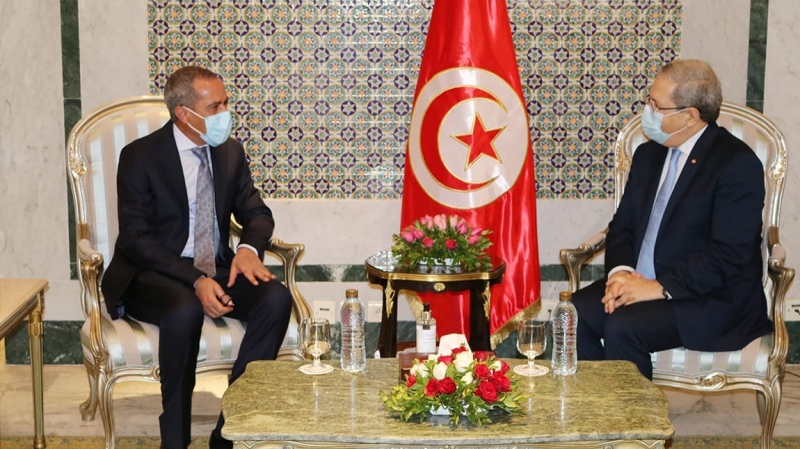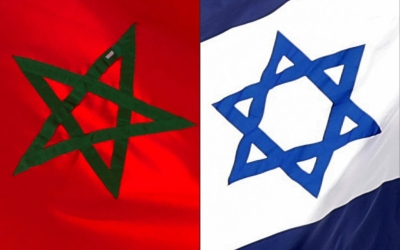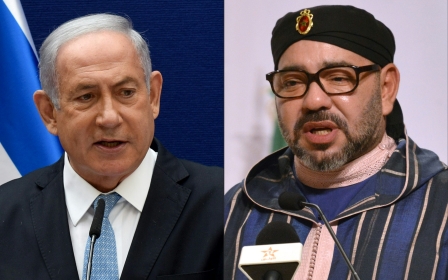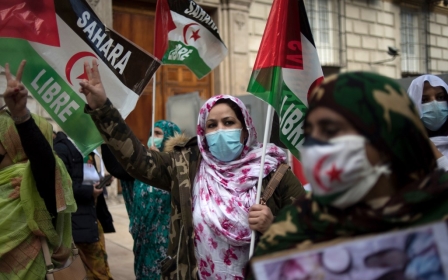Tunisia and Algeria try to cool tensions over Western Sahara

Tunisian and Algerian officials are attempting to put the lid on tensions between the countries that have erupted over the US recognition of Western Sahara as Moroccan territory.
Tunisia’s foreign minister, Othman Jerandi, and the Algerian ambassador to Tunis, Azzouz Baalal, met on Tuesday in a bid to calm tensions following heated exchanges in recent days.
Jerandi reiterated the country’s “excellent relations” with Algeria and reinforced Tunisia’s position that relations between Tunisia and Algiers cannot be altered because of “unofficial positions which do not commit Tunisia in any way”.
'Algeria played with fire and caused Morocco to accelerate the process of normalising relations with Israel and the division of the Maghreb region'
- Ahmed Ounaies, former foreign minister
The meeting came a day after comments made by former Tunisian foreign minister, Ahmed Ounaies, to a private radio, where he criticised Algeria's role regarding developments in Western Sahara. Algeria is a supporter of the Western Sahara independence movement.
“Algeria played with fire and caused Morocco to accelerate the process of normalising relations with Israel and the division of the Maghreb region,” Ounaies said, triggering a backlash from the Algerian public.
New MEE newsletter: Jerusalem Dispatch
Sign up to get the latest insights and analysis on Israel-Palestine, alongside Turkey Unpacked and other MEE newsletters
Morocco normalised relations with Israel as part of the deal that saw Washington recognise Rabat's sovereignty over Western Sahara, a disputed territory.
Ounaies, who served in Mohammed Ghannouchi’s government in 2011, also said that Algeria “turned against Morocco and Tunisia after the end of the colonial period” and annexed its neighbours’ land.
Whilst Algiers has not officially responded to Ounaies comments, Jerandi has tried to prevent tensions from escalating by reinforcing his country's "pride in brotherly relations with Algeria”.
Algeria: a protective 'big sister'
According to Tunisian analyst Youssef Cherif, who heads the Columbia Global Centers in Tunis, this isn’t the first time Ounaies has made similar comments against Algeria.
It is a position “shared by Tunisians who remember Algeria's pressures on the country in the 1970s and 1980s, when Cold War alliances put the two neighbours on the opposite sides,” he said.
“Ounaies, it should be reminded, belongs to the second generation of postcolonial Tunisian diplomats who were active between the 1960s and the 1990s,” Cherif told Middle East Eye.
“But many Tunisians think the other way round and believe Algeria is a protective 'big sister'."
Ouanies’ comments echo sentiments shared by former president Moncef Marzouki last month in which he stated that “the Algerian regime has committed crimes against its people, the Maghreb Union and the Sahrawi people”.
He also referred to the Sahrawis living in the Tindouf camps along Algeria’s border as "hostages".
The Algerian government criticised Marzouki’s statements against the country as “inappropriate” and “immoral, irrational and unjustified”.
Tunisia-Israel deal off the agenda
Despite rumours Tunisia could be one of the next Arab states to normalise relations with Israel, Prime Minister Hichem Mechichi has stated that his country has no intention of following in Morocco’s footsteps.
Speaking in an interview with broadcaster France 24 on Monday, Mechichi said: “For Tunisia, the question is not on the agenda,” but said he respected the choice of “a sister country that we love very much”.
'With regards to Israel and the Moroccan decision to normalise, I think a majority of Tunisians take Algeria's side. I hardly see any normalisation between Tunisia and Israel'
- Youssef Cherif, analyst
Cherif told MEE: “With regards to Israel and the Moroccan decision to normalise, I think a majority of Tunisians take Algeria's side. I hardly see any normalisation between Tunisia and Israel.”
“Public opinion is against it, the powerful labour union UGTT is also opposed, and so it will be hard for the democratic regime ruling Tunisia to impose such move the way autocrats in the UAE or Morocco are doing,” he added.
Tunisia’s position is one supported by Algeria, which has said the move by Morocco was part of “foreign manoeuvres which aim to destabilise” it and that it remains vigilant in its "unwavering support for the just cause" of the Sahrawi people.
On Monday, the Algerian foreign ministry released a statement reiterating “its categorical rejection of colonial ideology” and reaffirmed “its deep conviction that the completion of decolonisation will be inevitable everywhere in the world".
This article is available in French on Middle East Eye French edition.
Middle East Eye delivers independent and unrivalled coverage and analysis of the Middle East, North Africa and beyond. To learn more about republishing this content and the associated fees, please fill out this form. More about MEE can be found here.





